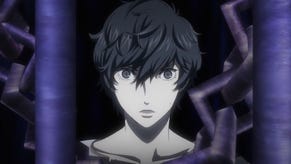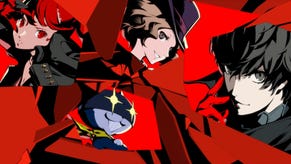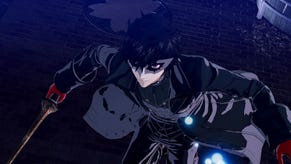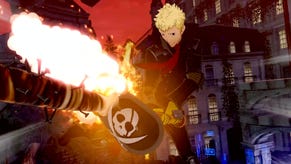Persona 5 Review
A stylish victory.
This article first appeared on USgamer, a partner publication of VG247. Some content, such as this article, has been migrated to VG247 for posterity after USgamer's closure - but it has not been edited or further vetted by the VG247 team.
There's a sharp ambience when I'm loitering in a cafe or subway overpass with the crew of Persona 5. Whether it's Ryuji's lackadaisically cuffed jeans and likely Manic Panic bleached hair, Ann's perky blonde pigtails, Yusuke's ever-poised posture, Makoto's perpetually stern expression, Futaba's oversized spectacles and dorky exterior, Haru's fluffy short hair and posh sweaters, or even the nameless Main Character with his hands permanently burrowed in the pockets of his slacks, as his feline(-ish) friend Morgana lightly peeks out of a school bag and rests his paws on the hero's shoulder as he meows at the group. To a random passerby, these mews would be nothing other than the yodels of a cat. To this gathering of friends, they're much more. Morgana's always spewing human words of encouragement. Or comic relief, depending on the talkative cat-being's mood.
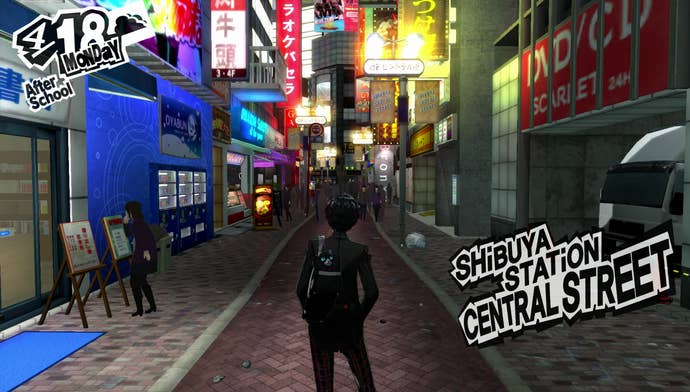
There's a feeling I get only after I finish a really great RPG. An emotion that's a strange mixture of freedom, happiness, survival, and relief. Where upon completion, I feel as if I've been given a new lease on existence; I've done all I can with that past life. All I can do now is sit back to recollect the good times (oh, those Confidants and the friends I made!) and the bad (oh, those unnecessary final hours!). And in spite of it all, it's time to go find a new adventure to grasp. After 102 hours and 45 minutes, my long, tumultuous journey with Persona 5 was over. And I felt all of those things, but mostly I found myself feeling sad. Sad that it was over, that is.
At its start, Persona 5 cast me as a hapless hero. I first saw him leaping across chandeliers in a bedazzled casino; long black coat flapping in the wind, a white mask shielding his face. He makes a daring escape, but not before battling a demon and ducking out of sight of security guards (a minor tutorial for battling and the essential stealth needed to bisect dungeons). By its end, he leaps out of a stained glass window, like an intentional version of Spike Spiegel's fateful fall, only to find himself arrested and told that a traitor ratted him out. Barely ten minutes into Persona 5, and more character drama is already afoot than Persona 3 and Persona 4 combined.
This prologue sets in motion what we see of our damaged hero, as he's then drugged, beaten by police, and tossed into a cold interrogation room. Prosecutor Sae Niijima weasels her way into the room to interrogate our mysterious protagonist, where she baits him into revealing more about the origins of his mysterious squad: the Phantom Thieves. Then, as if someone behind-the-scenes jazzily snaps their fingers with as much style as employed by the menu screens, we're transported eight months into the past: to April 20XX, when this glorious mess began.
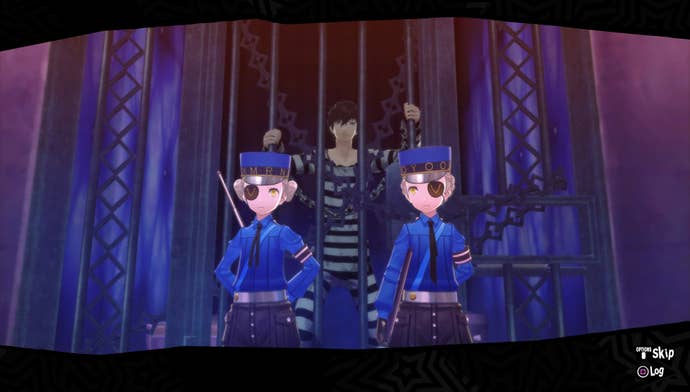
The opening hours of Persona 5 beyond the prologue are a slow burn. Our protagonist is firmly established as an outlaw, a teenager put on probation for a year after allegedly assaulting a man. He's now living in the dusty attic of his parents' friend's cafe in Tokyo, owned by the grumpy Sojiro Sakura. Then, by happenstance, he makes some friends. A conflict is established. Together, the new pals enter their first Palace (the game's deadlined dungeons themed after a malevolent individual's distorted desires, and as with prior Persona games, has to be completed by a specific date). The Palace visit invites our hero and his fateful friends to painfully awaken their Personas for the first time by ripping off their faces (a far cry from the Tarot cards of Persona 4, or the suicidal Evokers of Persona 3).
Persona 5 doesn't f**k around in its opening hours. It establishes its villain quickly, a scumbag I found myself detesting just as much as the characters I was spending time with did. The game also takes its time to both ease new players into the complicated loop of a game that straddles social simulation and dungeon crawling. That's in addition to carefully introducing the characters they'll be spending over a hundred hours with. With the game's stronger emphasis on story and characters (even more than the series' past), the slower pace is welcome even to older, familiar fans of the series.
Acquaintances in Persona 5 feel familiar at a glance. There's the silent protagonist, the pretty popular girl, the stern student council president, the goofy animal character, the rowdy best friend, and so on. Yet, Persona 5 is disinterested in those archetypes, letting each character smash through their stereotypes' typical expectations, as per the game's theme of disavowing society's constraining embrace. Ryuji may be loud and envisions punk like he overheard a single Ramones song at a Hot Topic, but he also dealt with his entire promising athletic career being upended by a malicious adult. Ann's the prettiest girl around, but her looks only serve to alienate her and cause her to be the focus of salacious rumors and gross predatory men. Morgana is a sassy cat creature, but he also battles intense existentialism. It's these breakthroughs beyond the surface that bring Persona 5's cast to life, away from even the adoring characters of the series' past.
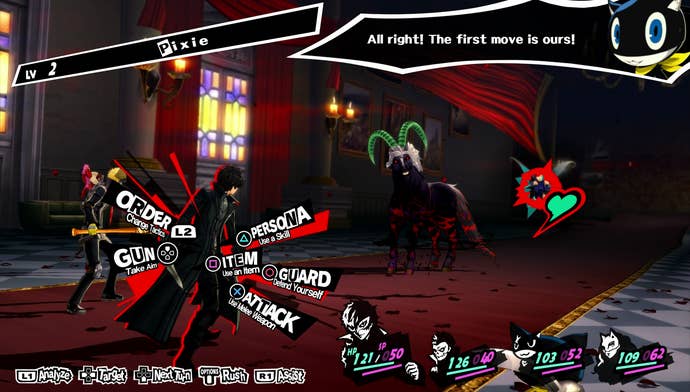
Palaces, Mementos, & Turn-Based Combat, oh my!
Palaces, contrary to the dungeons of Persona's past, are themed to a greater extent as they bounce from a castle to a fine art museum, to other bizarre materializations. By a Palace's end, the Phantom Thieves will effectively assure a passage to its "treasure." After ascertaining a route, the Phantom Thieves collectively send a calling card to their real-life foe (a taunting letter that typically reads like an eloquent version of "haha, the Phantom Thieves are gonna steal your heart dumbass, because you're evil!"). Then, with a jazzy Shoji Meguro track making you feel like anything is possible (even heart-stealing in shadow worlds), it's time to waltz back into the Palace. The party makes a beeline to the treasure, defeats a boss, steals that fateful treasure (which will restore a foe's heart and cause them to atone for their sins in a public manner), and escapes, sitting back as the Phantom Thieves are left feeling good about their latest, probably life-saving deed. Phew.
In addition to the Palaces, there's also Mementos, a procedurally-generated dungeon by way of Persona 3's Tartarus, burrowing into the shadow world of Shibuya Station's spiraling underground. To progress through Mementos is to ride within a transformed Morgana, who takes shape as—wait for it—a catbus. In Mementos, the targets are small-scale villains who aren't evil to the point of wielding their own Palaces (yet), like um, a man who tortures cats in Shibuya (which gets Morgana especially riled up). Yuuki Mishima, a Confidant befriended during the game's early hours, typically dishes out Mementos targets for the protagonist via text message. Mishima runs the Phantom Thieves' "Phan-Site" (lol), cordoning off particular bad folks that are detailed by random purveyors of the site's forum.
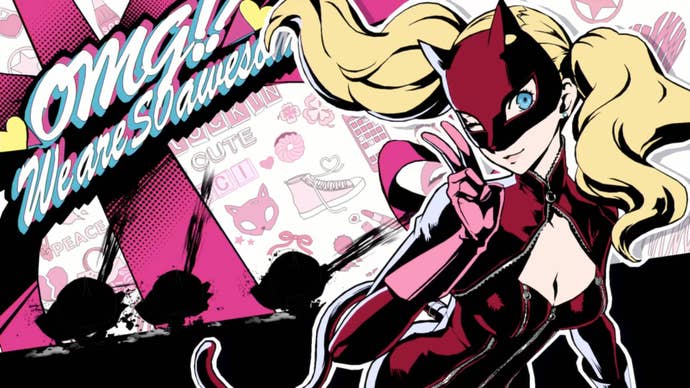
Mementos is optional though. You can choose to go after everyone, or ignore the targets that stack up, resolving to make Mementos into an infinite grind dungeon instead. (But I recommend the former, and if you do ignore it the whole game, uh, you'll end up regretting it.)
Battling in Persona 5 is a huge step-up from its predecessors, with the ability to chain attacks and other co-op moves unlocking as a Confidant with a teammate progresses. For instance, once I was in the heat of battle, when Haru—not currently in my party—dove out from the shadows, sniping an enemy from afar alongside me after asking if it was all right first. Persona 5 is stuffed with surprising party interactions not just outside of the shadow world, but within the heat of battle as well. That can come in the form of an expected high-five, or some unanticipated help. Battles also offer the additional option of holding-up shadowy demons with guns for ransom, robbing them of money, items, or even enlisting them to the protagonist's personal band of Personas. Or y'know, the All-Out Attack might finish 'em off.
Days in Persona 5 are spent however you like, which is their beauty. There's a multitude of random activities around Tokyo that raise miscellaneous stats, like eating a big ol' burger in hopes of increasing your Guts, going to see a movie in theaters that increases your Kindness, and so on. Some tasks boost particular stats more than others, and it's up to you to decide what's most useful on a particular day. While Persona 5 does away with school clubs (thank god), you can work a few jobs around Shibuya and beyond for some extra yen.
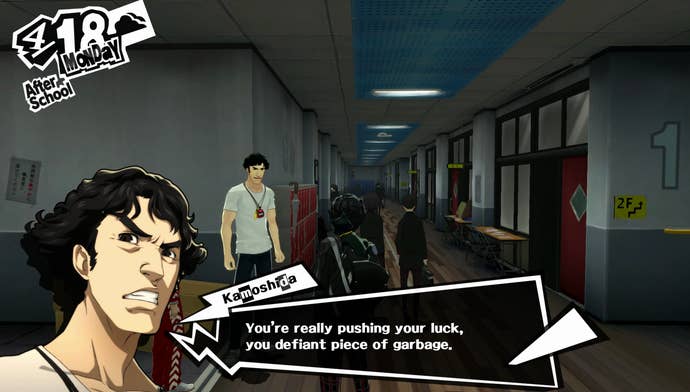
The most important way to spend days is through exploring Confidants. Like the Social Links of games past, Persona 5 gives numerous characters, both in and out of the party, their own subplots to explore at length. For the most part, Persona 5's side characters all have alluring, unique, and even sad stories to share with the player, like the clumsy teacher moonlighting a seedy job or the neighborhood doctor cast out of the elite medical world for her experimental medicine. Persona 5 rewarded my time spent with side characters not just with stories, but with battle-bound and in-world quirks as well. (Shouts out to Takemi for the medicine discounts.)
To talk about a Persona game is to talk about its sounds, from the victorious melodies you'll hear as you quite literally gallop (victoriously) out of battle with a wave for your comrades to follow as they stretch restlessly post-battle, to the familiar hymns that plague the Velvet Room (a room you will spend far too much time in because of persona fusioning). Persona 5's a game that's stylish from head to toe. It's the rare game that takes acid-jazz, over-stylized menus, battle sequences with pages ripped out of a highly-detailed action-oriented manga, and the color red, tossing it all into a blender to make a look that is so singular, that it's impossible to imagine it looking any less cool. It's a game that makes you feel rad with even the most humdrum tasks, like over managing your inventory or customizing guns at an airsoft gun shop.

Brand New Days
Playing Persona 5 feels especially salient in today's political climate, no matter where you reside in the world. After the Fukushima crisis in 2011, a new wave of civil unrest rose in Japan, as anti-fascist and anti-nuclear movements spread widely across the country. "Anger is an energy," Noma Yasumichi, culture critic and an organizer of TwitNoNukes, succinctly told Al Jazeera in early March of this year. Here in the United States, with the ongoing BlackLivesMatter movement among dozens of other like-minded movements, coupled with a frankly controversial leader in office, the country has followed a similar fashion of showing intense opposition to discrimination, hate speech, and the abusive people that reside in places of power.
In Persona 5, the Phantom Thieves are helming a similar demonstration of opposing authority, though rather than outright protesting, their anti-authority guidance arrives through their specific brand of supernatural vigilantism. Traipsing through dungeons and stealing the "hearts" of evildoers as the Phantom Thieves in the shadow world causes an individual in the real-world to atone for their sins. Whether this is directed towards manipulative adults (like an abusive teacher), or downright evil politicians, their intended result is always the same: to save others and make the world a better place. In Persona 5, adults continuously let the youth down and hurt them. And feeling underpowered in other aspects of their lives, they're left with no option other than to rise up, effectively say f**k authority, and take things into their own hands. In its best moments, Persona 5's disgraced characters' rising up is empowering.
But Persona 5 is not without its blemishes. Some Palaces, and the circumstances and tension surrounding them, feel less inspired than others. A couple of characters start off strong, but their stories fail to rise to the heights of the introductions to the Phantom Thieves' initial five. There are story beats that twist into risky, exciting directions, only to veer back onto the path of cold familiarity. There are disappointing characterizations—like an instance of two gay men in Shinjuku goofily preying on the protagonist and Ryuji, high school boys, played as a joke—that feel counterintuitive to the game's thematic reverence of striving for cultural acceptance in spite of oppression. This especially feels like a gut punch after befriending the friendly crossdressing bartender Lala in Shinjuku, who's never the butt of any punchline and is treated with respect and like, well, a human being.
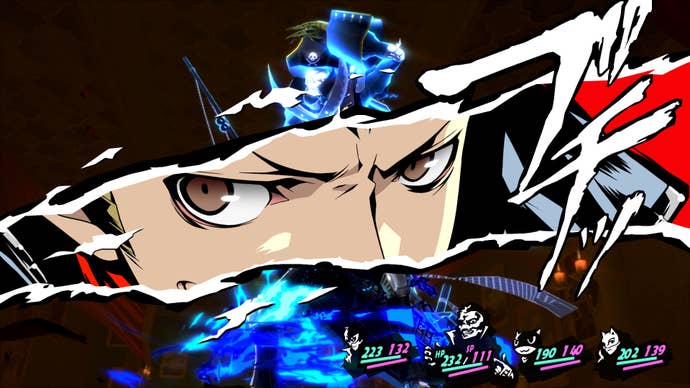
The game's final ten hours, gone of the thread that strings the first 90 along so swimmingly, feels like a tacked on "and then some" to the game before it; needless conflict to pad out ten more hours of egregious "content." Which, ultimately, makes its final conclusion feel more anticlimactic than it would have otherwise. Yet despite going off the rails a bit, I still found these grievances to be minor. Beyond them, I felt wholly engaged by the central story, my eyes narrowed upon its themes and my heart stolen by a cast of characters that I grew to love. It just so happened that the "and then some" felt like fat that could have been easily trimmed away, even if it didn't detract from the game before it.
In the end, Persona 5 is still a safe game in the series. It iterates in places where it needed: the Confidant system feels more fleshed out than Social Links despite sometimes fumbling into repetition (there's a nagging evil in a friend's life, better go steal their foe's heart in Mementos!). Dungeons are more puzzle-oriented and rely on stealth heavily, instead of being repetitive, infinite hallways. Turn-based combat is wickedly fast-paced and enjoyable, thanks in large part to the newly-implemented negotiations like the Shin Megami Tensei games of the past. The Main Character isn't a personality-less hunk of digital meat. He has an actual past, and a central struggle within himself, rather than existing as a baseless hero to center the plot around. Persona 5 made me really care about its characters, even the outlier Confidants untethered to my combatant mates, and the ones not structured through a Confidant. Tokyo's a bustling metropolis that its residents don't just live in, but call home, making Tokyo feel more alive than nearly any video game representation before it.
I often joke that everyone's favorite Persona game is the one they play first. For me, it was Persona 3 FES, a darker tale than its direct successor that I hold a special admiration for. For most others I know, Persona 4 (specifically its Golden remaster), a Scooby Doo-like murder mystery wrapped up in teen JRPG drama, reigns supreme. There's even the few that prefer the early games in the Persona series; the ones without the calendar-bound social simulation elements that veer more into classic Shin Megami Tensei territory. But after time spent with the phantom thievin' teens of tomorrow, Persona 5 might stand alone as the exception to this silently-acknowledged truth. It expertly weaves everything great about its predecessors into one slick adventure, plopping a tidy crimson bow on top as it gears up to steals everyone's hearts. Consider this your official calling card.
InterfacePersona 5 has more style on its start menu than some games strive to have in their entirety.
Lasting AppealMy initial playthrough lasted nearly 103 hours, but with a few spare Confidants still left to max out among other tasks I left to the wayside, I know that I'll return to its New Game+ one day.
SoundComposer Shoji Meguro takes cues from acid jazz to create another unforgettable soundtrack.
ConclusionWith the most bewitching tale the series has ever told and an incredibly likable cast that rises above their typical archetypes, Persona 5 sings a song of rebellion. Not just against the norm of JRPGs, but of society's oppressive grasp, inspiring its players to rise up as the Phantom Thieves would. In the end, in spite of its minor missteps, Persona 5 has the power to steal the hearts of longterm fans of the series and newcomers alike.




